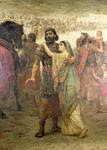Magic Flute and Karl Barth
 I must have performed Mozart's Magic Flute over 30 times, but Friday night was the first time I'd ever seen it! And it was a great experience. The occasion was prompted by Andrew, our youngest son, who loves all things dramatic, and requested that we see it, having been with the school to see Donizetti's L'Elisir d'Amore. Just to emphasise - he really is a normal teenager! Welsh National Opera did an imaginative, verging-on-the-surreal, production, with good voices, especially Pamina, and a fine orchestra, especially the principal bassoon. And as I've found before, Milton Keynes Theatre has great acoustics – and we should know as we were in the cheapest seats - you couldn't go much further back or higher up.
I must have performed Mozart's Magic Flute over 30 times, but Friday night was the first time I'd ever seen it! And it was a great experience. The occasion was prompted by Andrew, our youngest son, who loves all things dramatic, and requested that we see it, having been with the school to see Donizetti's L'Elisir d'Amore. Just to emphasise - he really is a normal teenager! Welsh National Opera did an imaginative, verging-on-the-surreal, production, with good voices, especially Pamina, and a fine orchestra, especially the principal bassoon. And as I've found before, Milton Keynes Theatre has great acoustics – and we should know as we were in the cheapest seats - you couldn't go much further back or higher up. Interestingly, I write about 'seeing' opera, whereas I would write about hearing an orchestra or chamber ensemble, or jazz group. There was plenty to see last night, but the hearing remains for me the main attraction. And especially when it's Mozart. Michael Mayne writing about Mozart's Clarinet Concerto, says, 'To listen to the adagio of the Clarinet Concerto, for example, is to perceive something wholly other: the sound of an infinite which transcends us and for which "beauty" is no description ... To describe such experience and revelation of transcendence, religious language still needs the word God'. And Hans Kung writes how the music of Mozart reveals 'how wafer-thin is the boundary between the human and the divine.'
When it comes to Mozart, Barth, arguably the greatest theological mind of the last century, had a huge amount to say. 'My very first hearing of great music – I must have been about five or six years old – was of Mozart. I can still recall: my father struck a few measures of 'The Magic Flute' ("Tamino mine, oh what happiness") on the piano. They went through me and into me, I don't know how, and I thought, 'That's it!' Probably his most quoted words on Mozart are, 'it may be that when the angels go about their task of praising God, they play only Bach. I am sure, however, that when they are together "en famille", they play Mozart and that then too our dear Lord listens with special pleasure.'
It's no exaggeration to say that Mozart was his fixation and he believed deserved a central place in theology, especially the doctrine of creation and eschatology. For Barth, Mozart's music embodies and gives voice to creation praising God, and creation precisely as created – limited and finite.
In Eberhard Busch's biography of Barth, he wrote, 'Barth's objection to Johann Sebastian Bach, otherwise so loved by theologians, was his all too deliberate, all too artificial "desire to preach", while Mozart attracted him because he was free from such intentions and simply played.' And it is on Mozart's freedom as an analogy of the freedom that the gospel brings that Barth writes with such insight. 'From the beginning, he moved freely within the limits of the musical laws of his time, and then later ever more freely. But he did not revolt against these laws; he did not break them. He sought to be himself and yet achieved his greatness precisely in being himself while observing the conventions which he imposed upon himself.'
'Mozart's music always sounds unburdened, effortless, and light. This is why it unburdens, releases, and liberates us. He plays and never stops playing, and the listener who does not himself sway and soar, who does not play along with him, is not truly hearing him. But neither is one truly hearing him if he is heard as a musician of mere facile gaiety. Behind his play there is an iron zeal … I found it happily expressed recently, "His gravity soars and his lightness is infinitely grave."'
Last night as Pamina sang, 'Tamino mine, oh what happiness', as I became aware of the 'wafer-thin boundary', I gave a conscious nod to Karl.


Comments
Thanks for this. I sometimes think that Barth needed to hear Bach played on original instruments, my experience is that you then get much more of the play and much less of the preach. I had one churvh member in Reading whose idea of showing the minister post-service hospitality was to feed them well and then sit down and listen to the Magic Flute all afternoon - heaven!
That sounds like excellent hospitality. You make a good point about Bach on original instruments. I recall you mentioning the latest Dunedin Consort recording which I heard a bit of on Radio 3. I bought the John Eliot Gardener boxed set last year, so can't justify it yet, but it was yet another sound world. Hope you're enjoying the sabbatical.